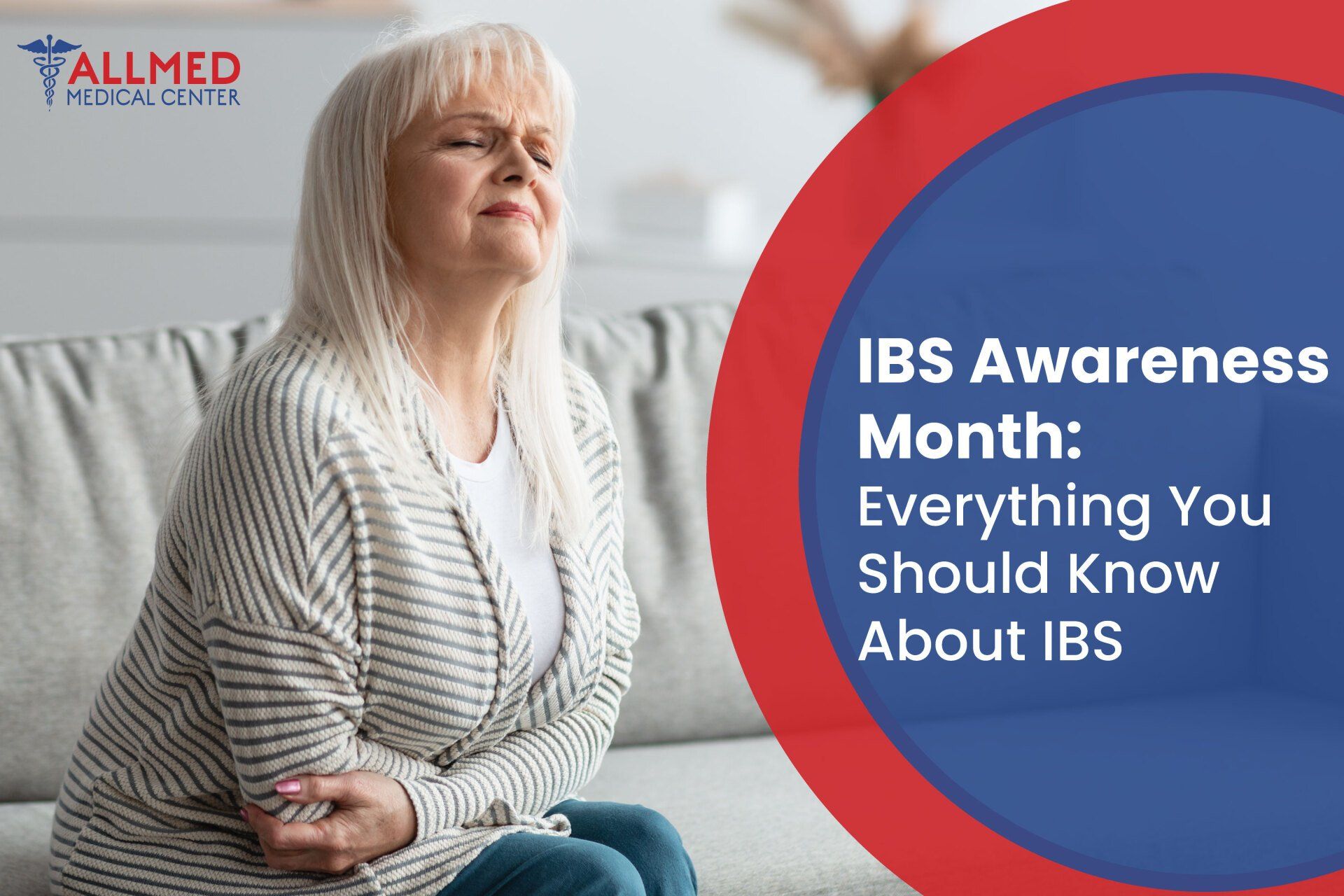
We Proudly Accept Medi-Cal and Medicare
Write your caption hereButton
Now Accepting Walk-ins!
Write your caption here

We Proudly Accept Medi-Cal and Medicare
Write your caption hereButton
Now Accepting Walk-ins!
Write your caption here

April is IBS Awareness Month
Irritable bowel syndrome (IBS) is a common abdominal disorder that could happen to anyone regardless of gender, age, or ethnicity. It causes abdominal pain and discomfort that ranges from mild to severe. However, individuals with irritable bowel syndrome rarely experience severe complications.
This month, join us in raising awareness of irritable bowel syndrome to help people living with this adverse health condition manage the disorder better. This blog post will discuss essential factors associated with IBS, including its signs and symptoms, causes, risk factors, and treatment.
What is Irritable Bowel Syndrome?
Irritable bowel syndrome or IBS is an adverse health condition that mainly affects the large intestines. It is a gastrointestinal disorder (GI); individuals may experience excessive gas, cramps, or pain and discomfort in the abdomen.
What is Gastrointestinal Disorder (GI)?
Gastrointestinal disorder encompasses the connection between your brain and your gut and how they function together. It is also known as the gut-brain interaction. Problems with the gut-brain interaction typically affect the contraction of your bowel muscles. Therefore, it may lead to constipation, tummy ache, or diarrhea.
The Different Types of IBS
IBS has three types which are:
- IBS with Diarrhea or IBS-D
This type of irritable bowel syndrome causes watery or loose excrement.
- IBS with Constipation or IBS-C
This type of irritable bowel syndrome causes lumpy or hard excrement.
- IBS with Mixed Bowel Habits
You may experience both watery or loose and lumpy or hard bowel movements on the same day.
Irritable Bowel Movements Signs and Symptoms
The common signs and symptoms of irritable bowel syndrome include the following:
- Bloating
- Abdominal pain and discomfort (cramps from the lower half of the abdomen)
- Unusual changes in bowel movements (loose or lumpy)
- Alternating cases of diarrhea and constipation
- Excessive gas
- Mucus in the excrement (whitish color)
Note: Although both men and women experience IBS, women may have the worst end of the stick during their menstruation period. The typical IBS symptoms mentioned above may become worse and recurring. For women, the discomfort from IBS and their period usually lead to being upset and stressed.
Causes of IBS
Doctors and medical experts are yet to identify the exact cause of irritable bowel syndrome. However, they have identified the factors that play a role in IBS, including the following:
Many factors contribute to gastrointestinal infections like bacteria and viruses. In addition, severe diarrhea could also cause gastroenteritis.
Microbes
The bacteria that reside in people's guts may be one of the reasons why people develop IBS. According to medical researchers, people with IBS have different microbes than healthy individuals.
The Nervous System
Poor communication and coordination of signals between the brain and the intestines cause your body to react negatively, affecting the digestive system—the abnormalities when your abdomen transitions from gas to stool may cause pain and discomfort. What's more, it causes constipation or diarrhea.
Intestine Muscle Contractions
The intestines have walls of layered muscles, and they contract when digesting food. Intense and prolonged contractions cause excessive gas, diarrhea, and bloating. On the other hand, weak and short contractions lead to lumpy or hard stools.
Triggers
Stress
Stressful situations would cause IBS, especially if the person experienced stressful events when they were younger.
Food intolerance occurs when the digestive system has difficulty breaking and absorbing specific foods. The symptoms may be similar to food allergies. On the contrary, your immune system has nothing to do with it.
IBS Complications
A chronic case of IBS may cause complications like:
Extreme mood swings. Dealing with recurring symptoms of IBS causes stress and discomfort that leads to intense mood changes. What's more, it may develop into depression and anxiety.
Poor lifestyle quality. Many individuals with chronic IBS have a poor quality of life. The symptoms disrupt their rest and sleep, affecting their overall lifestyle quality.
Risk Factors of IBS
You have an increased risk of developing IBS when you:
- Have a family history of IBS
- Below 50
- Females
- Have mental disorders like depression, anxiety, or family trauma
When to Consult a Doctor
Consider talking to your physician when the signs and symptoms of IBS get worse. Or if you experience:
- Anal bleeding
- Unexplained vomiting
- Sudden Weight loss
- Difficulty swallowing
- Iron deficiency anemia
- Diarrhea during nighttime
- Fever
Treatment for IBS
The treatment for IBS includes medication, dietary, and activity changes. The entire treatment plan works only with your willingness and coordination.
Medication
The medication approach includes drugs to manage diarrhea, constipation, or excessive gas. The type of medication needed depends on the type of IBS you have. Your doctor may also include good bacteria known as probiotics. Probiotics help improve the negative symptoms.
Dietary Approach
Dietary changes help treat the symptoms of IBS. These may include
- Increased fiber consumption
- More fluid intake
- Limiting dairy products
- Avoiding caffeine
Activity Changes
Engaging in an active lifestyle helps with the overall treatment of IBS and its complications. Your doctor may recommend
- Regular exercise
- Relaxation techniques
- Quitting smoking
- Avoiding alcoholic beverages
The Importance of National IBS Day
We encourage you to join this month's IBS awareness campaign. Sharing your stories and experiences could help other people deal with IBS better.
Get the Best IBS Treatment and Management at AllMed Medical Center
AllMed Medical Center provides the best IBS treatment for the entire family. Our health providers have multiple specializations under their belt, ensuring the best treatment approach for all types of IBS.
We have the most reliable gastroenterologists to help treat and manage IBS and its complications. If you want
quality treatment for your IBS, call 1-8333-255-6332 and schedule an appointment today.
AllMed Medical CentersServing
Greater Sacramento
Allmed Medical Center | All Rights Reserved.










